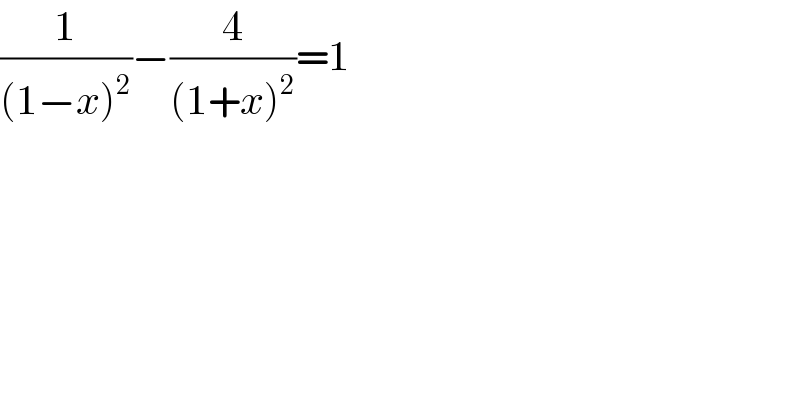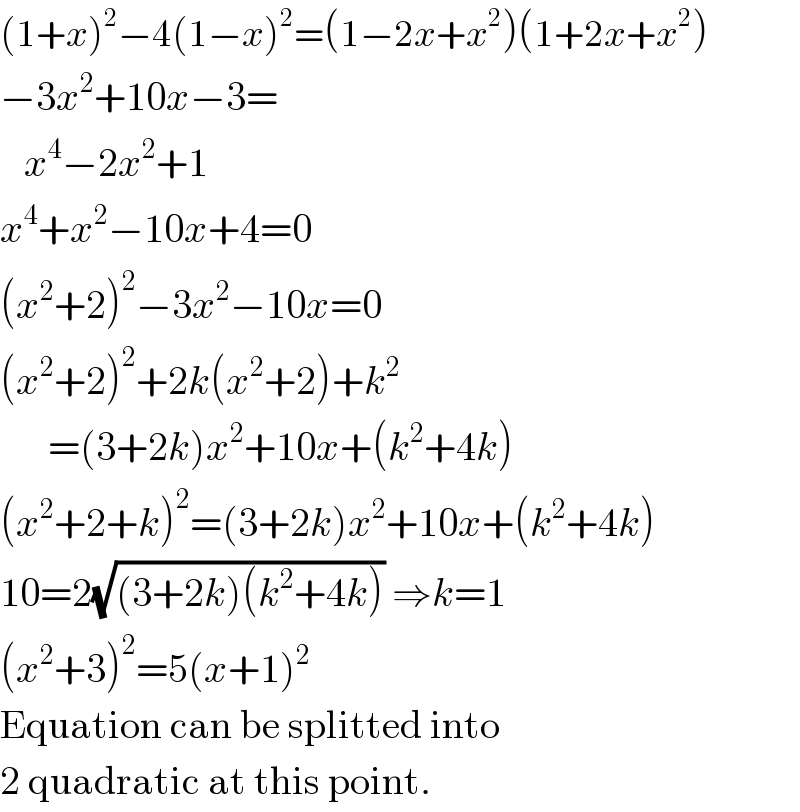Question Number 104621 by ajfour last updated on 22/Jul/20

$$\frac{\mathrm{1}}{\left(\mathrm{1}−{x}\right)^{\mathrm{2}} }−\frac{\mathrm{4}}{\left(\mathrm{1}+{x}\right)^{\mathrm{2}} }=\mathrm{1} \\ $$
Answered by prakash jain last updated on 22/Jul/20

$$\left(\mathrm{1}+{x}\right)^{\mathrm{2}} −\mathrm{4}\left(\mathrm{1}−{x}\right)^{\mathrm{2}} =\left(\mathrm{1}−\mathrm{2}{x}+{x}^{\mathrm{2}} \right)\left(\mathrm{1}+\mathrm{2}{x}+{x}^{\mathrm{2}} \right) \\ $$$$−\mathrm{3}{x}^{\mathrm{2}} +\mathrm{10}{x}−\mathrm{3}= \\ $$$$\:\:\:{x}^{\mathrm{4}} −\mathrm{2}{x}^{\mathrm{2}} +\mathrm{1} \\ $$$${x}^{\mathrm{4}} +{x}^{\mathrm{2}} −\mathrm{10}{x}+\mathrm{4}=\mathrm{0} \\ $$$$\left({x}^{\mathrm{2}} +\mathrm{2}\right)^{\mathrm{2}} −\mathrm{3}{x}^{\mathrm{2}} −\mathrm{10}{x}=\mathrm{0} \\ $$$$\left({x}^{\mathrm{2}} +\mathrm{2}\right)^{\mathrm{2}} +\mathrm{2}{k}\left({x}^{\mathrm{2}} +\mathrm{2}\right)+{k}^{\mathrm{2}} \\ $$$$\:\:\:\:\:\:=\left(\mathrm{3}+\mathrm{2}{k}\right){x}^{\mathrm{2}} +\mathrm{10}{x}+\left({k}^{\mathrm{2}} +\mathrm{4}{k}\right) \\ $$$$\left({x}^{\mathrm{2}} +\mathrm{2}+{k}\right)^{\mathrm{2}} =\left(\mathrm{3}+\mathrm{2}{k}\right){x}^{\mathrm{2}} +\mathrm{10}{x}+\left({k}^{\mathrm{2}} +\mathrm{4}{k}\right) \\ $$$$\mathrm{10}=\mathrm{2}\sqrt{\left(\mathrm{3}+\mathrm{2}{k}\right)\left({k}^{\mathrm{2}} +\mathrm{4}{k}\right)}\:\Rightarrow{k}=\mathrm{1} \\ $$$$\left({x}^{\mathrm{2}} +\mathrm{3}\right)^{\mathrm{2}} =\mathrm{5}\left({x}+\mathrm{1}\right)^{\mathrm{2}} \\ $$$$\mathrm{Equation}\:\mathrm{can}\:\mathrm{be}\:\mathrm{splitted}\:\mathrm{into} \\ $$$$\mathrm{2}\:\mathrm{quadratic}\:\mathrm{at}\:\mathrm{this}\:\mathrm{point}. \\ $$
Commented by ajfour last updated on 24/Jul/20

$${thanks}!\:{prakash}\:{Sir},\:{but}\:{generally} \\ $$$${finding}\:\boldsymbol{{k}}\:,\:{would}\:{require},\:{solving}\:{a} \\ $$$${cubic},\:{i}\:{believe}.. \\ $$
Commented by prakash jain last updated on 24/Jul/20

$$\mathrm{I}\:\mathrm{found}\:\mathrm{as}\:\mathrm{solution}\:\mathrm{was}\:\mathrm{obvious}. \\ $$$$\mathrm{You}\:\mathrm{are}\:\mathrm{right}. \\ $$
